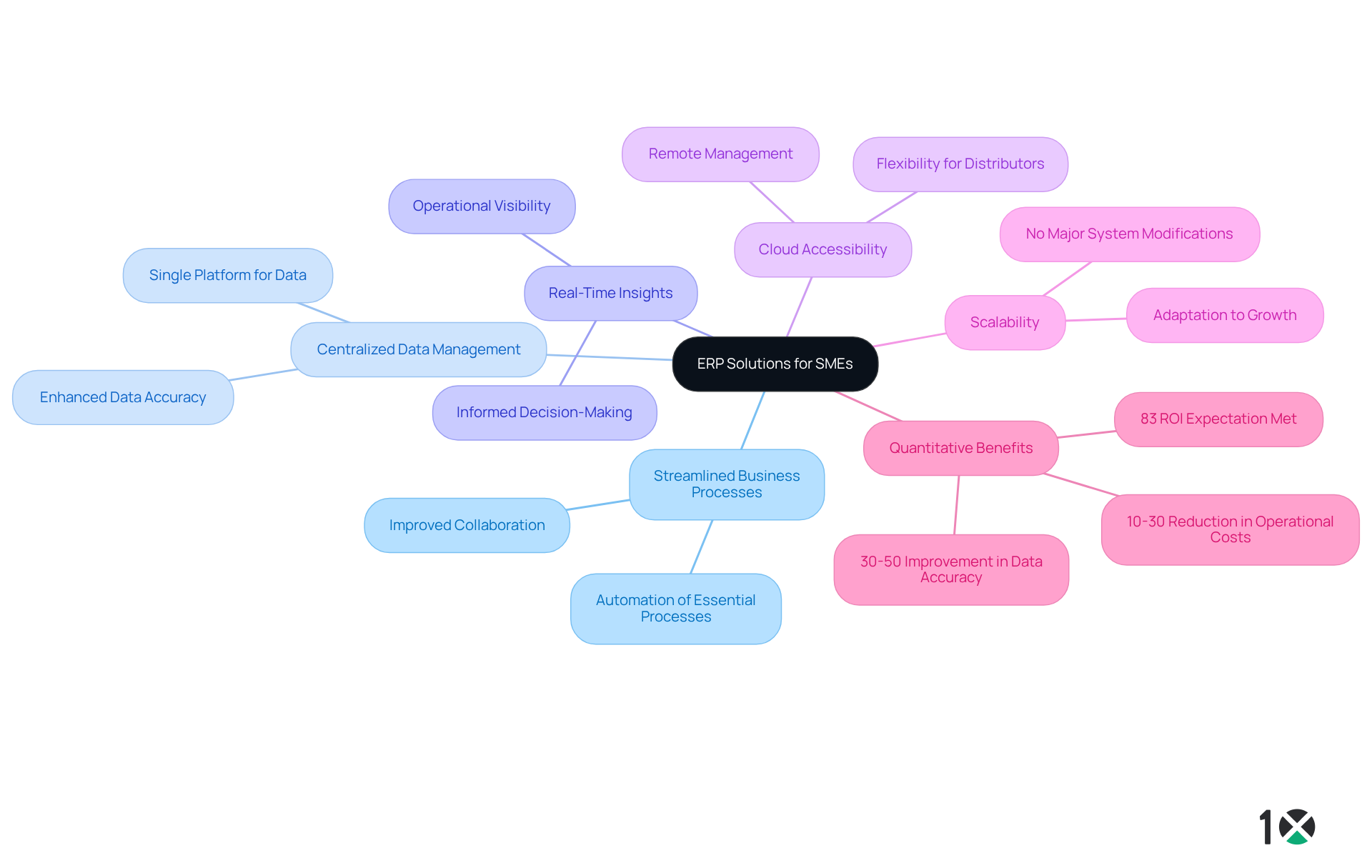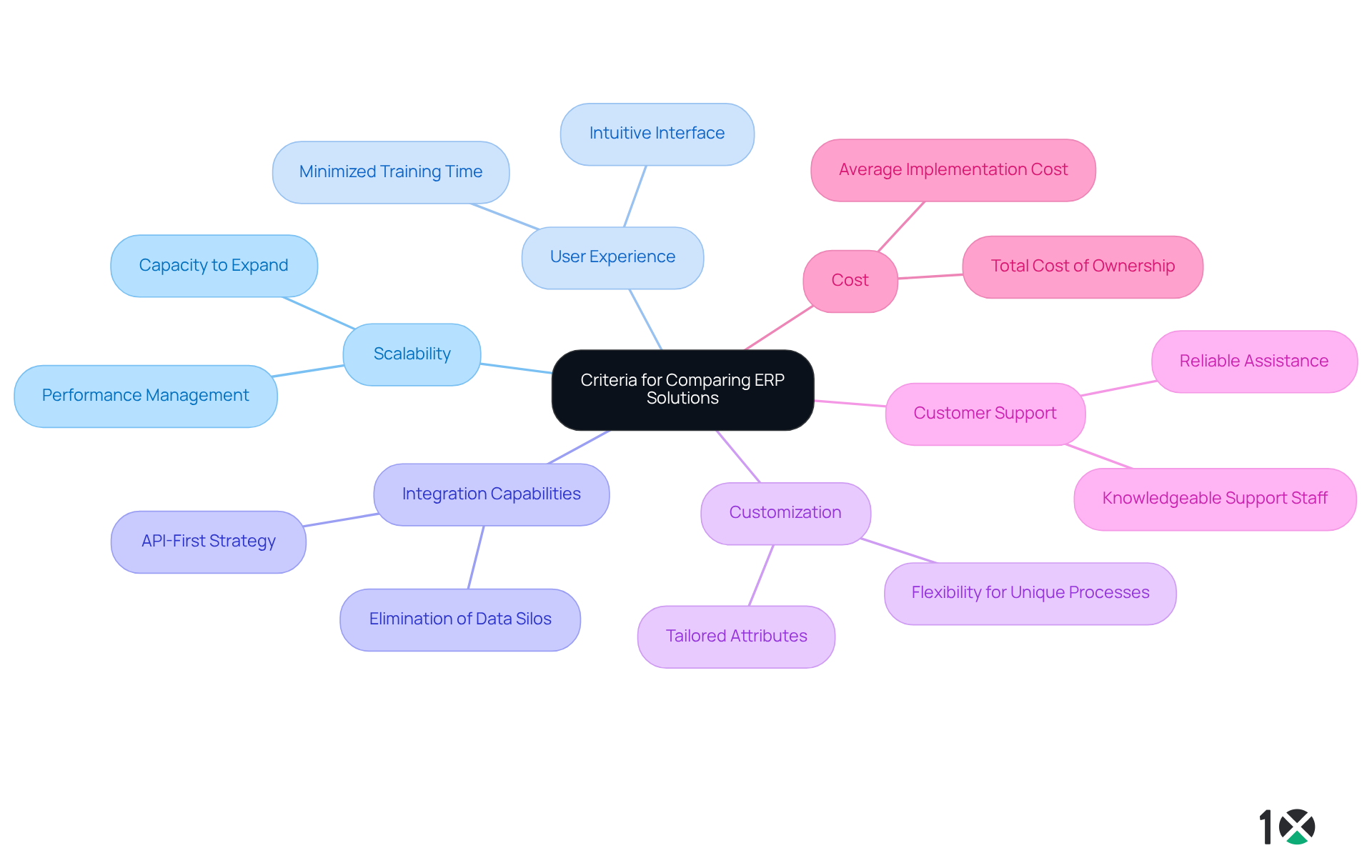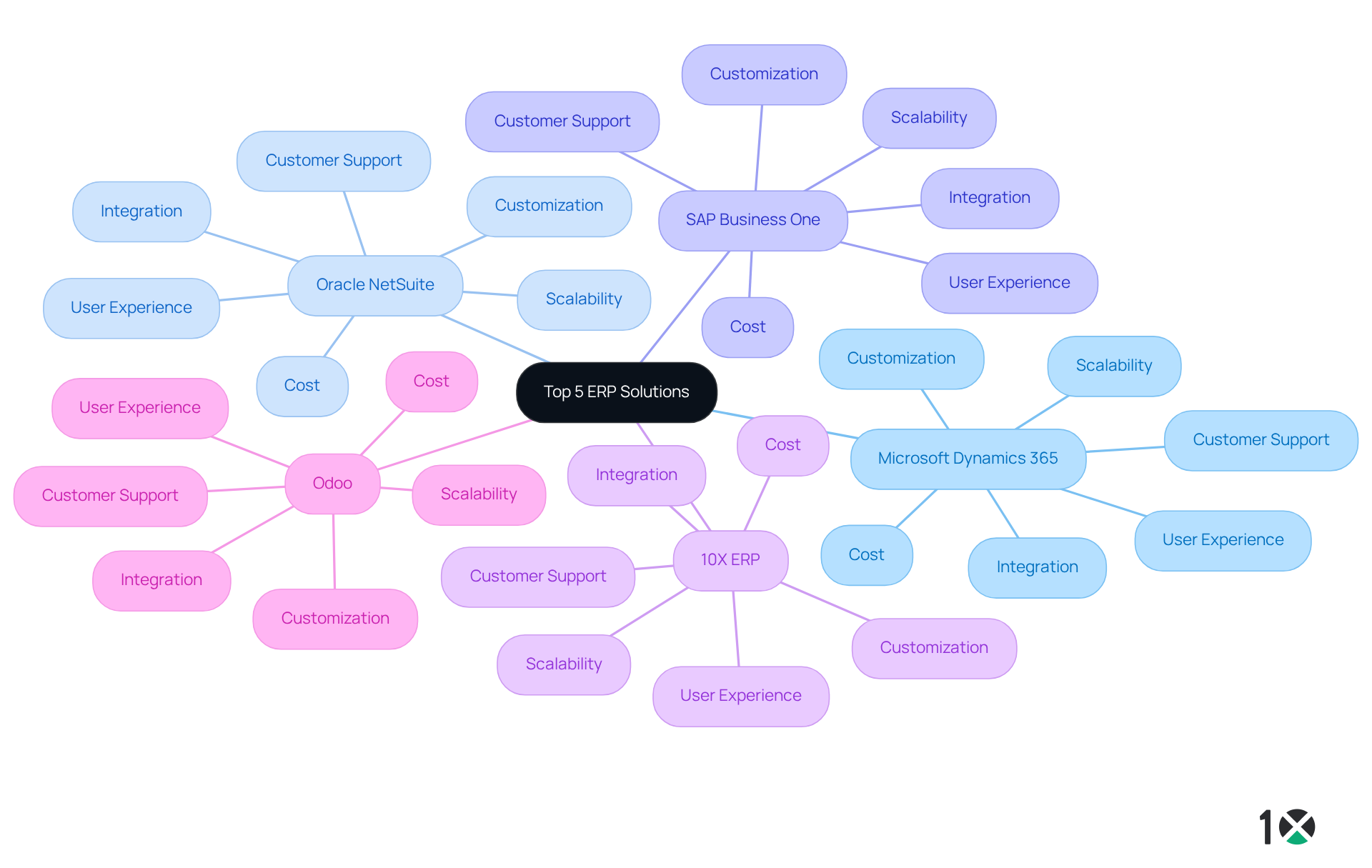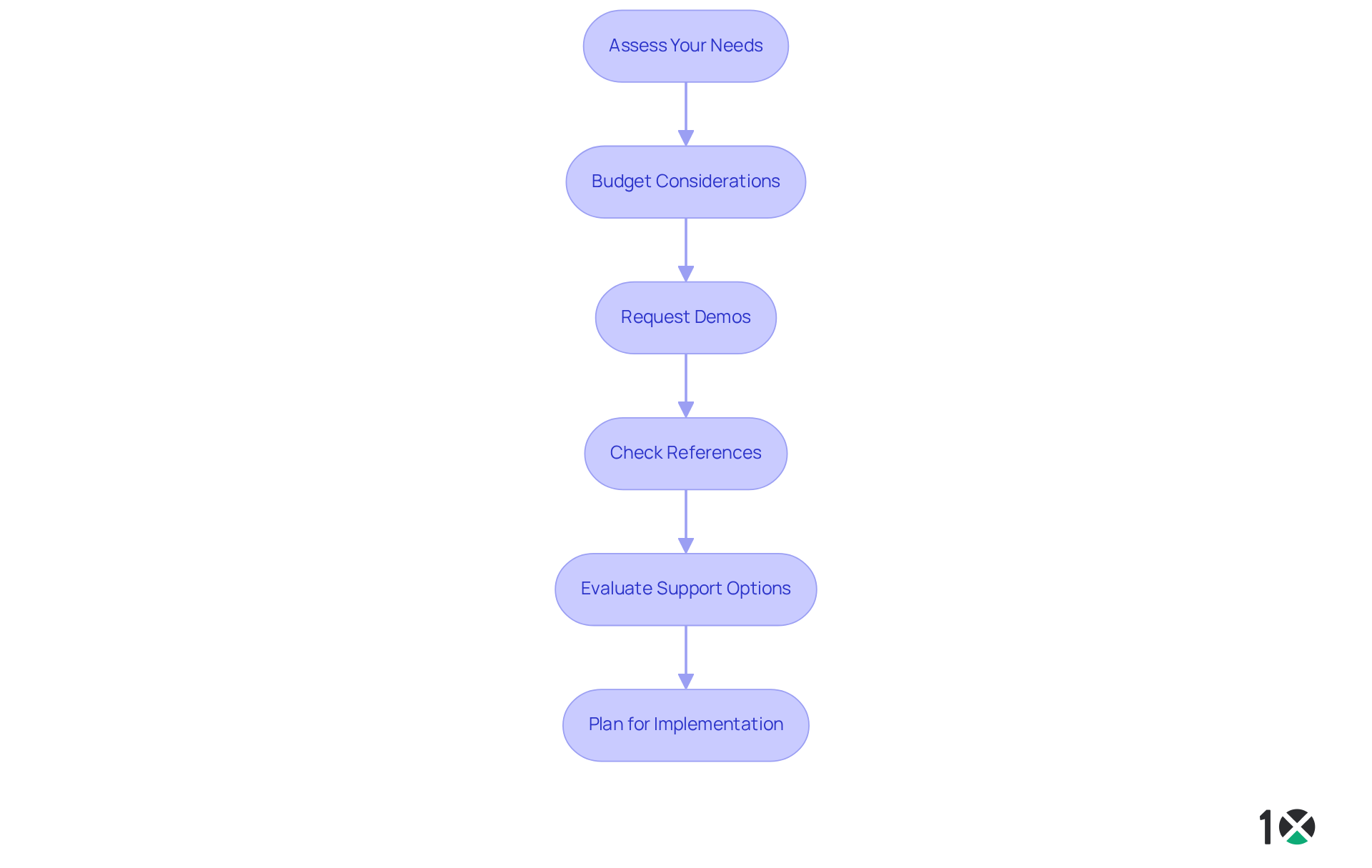Overview
This article identifies the best ERP solutions for small and medium enterprises (SMEs) by outlining essential criteria and providing a comparative analysis of five leading options. Choosing the right ERP solution, such as 10X ERP, is critical; it hinges on factors like:
- Scalability
- User experience
- Integration capabilities
- Cost-effectiveness
These elements are crucial for enhancing operational efficiency and supporting business growth. Understanding these criteria can empower Operations Managers to make informed decisions that drive success.
Introduction
Navigating the complexities of running a small or medium enterprise (SME) can often feel daunting, particularly in the realm of resource and data management. However, with the advent of cloud-based Enterprise Resource Planning (ERP) systems, SMEs now have access to powerful tools designed to streamline operations and enhance decision-making.
This article delves into the top five ERP solutions specifically tailored for SMEs, highlighting their unique features and benefits. Additionally, it addresses the critical factors influencing the selection process.
As businesses strive for efficiency and adaptability in a competitive landscape, the pressing question arises: how can SMEs select the right ERP solution that not only meets their current needs but also supports future growth?
Understanding ERP Solutions for SMEs
Enterprise Resource Planning (ERP) solutions are integrated software platforms that streamline and automate essential business processes across various departments, such as finance, inventory, and human resources. For small and medium businesses, ERP for SME provides a centralized method for data management, enabling real-time insights that enhance decision-making. By consolidating multiple functions into a single platform, small and medium enterprises can significantly boost efficiency, reduce operational costs, and elevate customer satisfaction.
The cloud-based nature of modern ERP solutions, like 10X ERP, offers unparalleled accessibility, allowing users to manage operations from any location. This who need to respond swiftly to market changes. Moreover, ERP for SME systems are designed to scale with company growth, enabling small and medium enterprises to adapt to changing demands without necessitating significant system modifications.
Real-world examples emphasize the advantages of cloud-based ERP: businesses report a 30-50% improvement in data accuracy post-implementation, which is vital for informed decision-making. Additionally, 83% of organizations that conducted an ROI analysis before implementation found that their projects met or exceeded expectations, underscoring the strategic value of ERP systems. As small and medium enterprises increasingly acknowledge these benefits, the adoption of ERP for SME solutions continues to rise, positioning them as essential tools for operational success.

Criteria for Comparing Top ERP Solutions
When evaluating ERP solutions for SMEs, several essential criteria must be taken into account:
- Scalability: The capacity of an ERP system to expand in tandem with an organization is paramount. Solutions like 10X ERP effectively manage increasing data volumes and user counts without sacrificing performance. As SMEs expand, their ERP for SME needs evolve, making scalability a critical factor in achieving long-term success.
- User Experience: A user-friendly interface is vital for enabling employees to navigate the system with ease. 10X ERP is designed with an intuitive user experience that minimizes training time and enhances productivity, allowing staff to focus on strategic tasks rather than grappling with complex software. A seamless user experience can significantly impact overall operational efficiency. As Tajammul Pangarkar observed, “ERP software has become essential for organizations in today’s competitive environment.”
- Integration Capabilities: The ERP should integrate smoothly with existing software and applications, creating a cohesive operational ecosystem. 10X ERP’s API-first strategy enables effortless integration with nearly any other software your organization uses now or in the future. Effective integration eliminates data silos and promotes real-time visibility across departments, which is crucial for informed decision-making. For example, organizations that successfully integrate their ERP with CRM systems often report enhanced customer service and operational efficiency. Significantly, 64% of small enterprises currently utilize some type of ERP for SME software, emphasizing the increasing trend in the market.
- Customization: The flexibility to tailor the ERP system to specific organizational needs can greatly enhance its effectiveness. 10X ERP for SME provides customizable attributes and powerful cross-referencing, allowing SMEs to tailor the software to their unique processes, ensuring that the ERP aligns with their operational goals. This adaptability is especially advantageous for companies in dynamic sectors that necessitate rapid modifications to their workflows. Additionally, the reliable inventory management features of 10X ERP ensure that businesses can track their inventory accurately, further enhancing customization and operational efficiency.
- Customer Support: Reliable customer service and support are essential for promptly resolving issues and ensuring smooth operations. 10X ERP for SME provides extensive assistance, which is vital for small and medium-sized enterprises encountering distinct challenges. Having access to knowledgeable support can make a significant difference in overcoming obstacles during implementation and beyond.
- Cost: Comprehending the total cost of ownership, which encompasses licensing, implementation, and ongoing maintenance, is essential for budget-aware small and medium enterprises. With the for small businesses hovering around $9,000 per user, careful financial planning is necessary to ensure that the chosen solution provides a solid return on investment. 10X ERP’s transparent pricing structure makes it easy to understand the value you’re getting, both now and as you grow. This financial context is vital for small and medium-sized enterprises to make informed decisions.
By considering these criteria, small and medium-sized enterprises can make informed decisions when selecting an ERP for SME that not only addresses their current needs but also fosters their growth and operational efficiency in the long run. Moreover, real-life instances, like the enhanced visibility offered by ERP software, demonstrate how these systems improve decision-making abilities for small and medium enterprises.

Comparative Analysis of the Top 5 ERP Solutions
This comparative analysis highlights five leading ERP solutions tailored for SMEs, focusing on their scalability, user experience, integration capabilities, customization options, customer support, and cost-effectiveness:
- Microsoft Dynamics 365
- Oracle NetSuite
- SAP Business One
- 10X ERP
- Odoo
ERP Solution Comparison:
-
Microsoft Dynamics 365:
- Scalability: High
- User Experience: Excellent
- Integration: Strong
- Customization: Moderate
- Customer Support: Good
- Cost: Moderate
-
Oracle NetSuite:
- Scalability: High
- User Experience: Good
- Integration: Excellent
- Customization: High
- Customer Support: Excellent
- Cost: High
-
SAP Business One:
- Scalability: Moderate
- User Experience: Good
- Integration: Moderate
- Customization: Moderate
- Customer Support: Good
- Cost: Moderate
-
10X ERP:
- Scalability: High
- User Experience: Excellent
- Integration: Strong
- Customization: High
- Customer Support: Excellent
- Cost: Competitive
-
Odoo:
- Scalability: High
- User Experience: Good
- Integration: Strong
- Customization: High
- Customer Support: Good
- Cost: Low
Microsoft Dynamics 365 is recognized for its robust features; however, its complexity may present challenges for smaller businesses. In contrast, Oracle NetSuite excels in scalability and integration but comes with a higher price point, making it a significant investment for those seeking comprehensive solutions. SAP Business One offers solid functionality but may fall short in customization flexibility, which could limit its effectiveness for certain users.
On the other hand, 10X ERP distinguishes itself with a user-friendly interface, strong integration capabilities, and an all-inclusive pricing model that encompasses all necessary features and tools. This makes it particularly well-suited for distributors aiming for . The platform emphasizes data integrity through premium cloud server hosting and continuous data backup, ensuring high availability and security. Additionally, the lifetime partnership aspect of customer support provides ongoing assistance, thereby enhancing the overall user experience.
Lastly, Odoo presents a cost-effective solution with high customization potential, though it may necessitate more technical expertise during implementation.
Overall, 10X ERP for SME offers competitive pricing and excellent customer support, making it a compelling choice for SMEs looking to enhance their operational efficiency.

Choosing the Right ERP Solution for Your Business
Choosing the right ERP solution for your business involves several strategic steps:
- Assess Your Needs: Begin by identifying the specific challenges your organization faces. Understanding these challenges will help you prioritize the features that are essential for your operations.
- Budget Considerations: Establish a clear budget for both initial implementation and ongoing costs. On average, small enterprises assign roughly 1% of their operating budget to ERP for SME implementation, with the typical expense around $9,000 per user. It’s crucial to consider the total cost of ownership, including potential hidden costs associated with maintenance and upgrades.
- Request Demos: Engage with vendors to request demonstrations of their systems. This hands-on experience will provide and functionality, helping you gauge how well the system meets your needs.
- Check References: Consult with other companies that have implemented the ERP solutions you are considering. Gathering feedback on their experiences can provide a clearer picture of the system’s effectiveness and vendor support.
- Evaluate Support Options: Ensure that the vendor offers robust customer support and comprehensive training resources. Effective support is vital for successful onboarding and ongoing use, as around 65% of organizations report dissatisfaction due to inadequate vendor support post-implementation. With 10X ERP, users benefit from in-app video guides created by the developers, making it easy to train new users or refresh knowledge on specific features without leaving the app. This streamlined approach enhances the overall user experience and ensures that help is just a couple of clicks away. Additionally, 10X ERP features a comprehensive suite of components designed to support your distribution operations, ensuring a seamless user experience from the start.
- Plan for Implementation: Consider the time and resources required for implementation. ERP for SME projects usually take between 3 to 9 months to complete. A well-planned rollout can significantly enhance user adoption and overall success. 10X ERP offers a transparent launch journey with real-time status updates, ensuring that you are informed throughout the process. This detail is crucial for connecting the planning process to the expected timeline.
By following these steps, SMEs can utilize ERP for SME to make informed decisions that align with their operational goals, ultimately enhancing efficiency and productivity. Additionally, it’s worth noting that 66% of organizations reported improved operational efficiency due to their ERP systems, emphasizing the importance of careful selection and assessment. Furthermore, be aware that 50% of ERP implementations fail on their first attempt, serving as a cautionary note during the selection process.

Conclusion
Selecting the right ERP solution is a pivotal decision for small and medium enterprises (SMEs) aiming to enhance operational efficiency and drive growth. The integration of ERP systems streamlines processes, improves data accuracy, and facilitates real-time insights, ultimately leading to better decision-making and increased customer satisfaction. Modern ERP solutions, such as 10X ERP, provide the scalability and accessibility necessary for SMEs to thrive in a competitive environment.
Key insights from the comparative analysis underscore the importance of evaluating various criteria when choosing an ERP system. Factors such as:
- Scalability
- User experience
- Integration capabilities
- Customization options
- Customer support
- Cost-effectiveness
play a crucial role in determining the best fit for an organization’s unique needs. Notably, 66% of organizations report improved operational efficiency post-implementation, indicating that the strategic selection of an ERP system can significantly impact a business’s success.
As SMEs navigate the complexities of ERP selection, it is essential to approach the decision-making process with careful consideration of specific business needs and budget constraints. Engaging with vendors, assessing user experiences, and planning for implementation can pave the way for successful ERP adoption. By prioritizing the right features and support, businesses can leverage ERP solutions to enhance their operational capabilities and position themselves for sustainable growth in the future.
Frequently Asked Questions
What are ERP solutions for SMEs?
ERP solutions for SMEs are integrated software platforms that streamline and automate essential business processes across various departments, such as finance, inventory, and human resources, providing a centralized method for data management.
How do ERP solutions benefit small and medium businesses?
ERP solutions help small and medium businesses boost efficiency, reduce operational costs, and enhance customer satisfaction by consolidating multiple functions into a single platform and providing real-time insights for better decision-making.
What is the significance of cloud-based ERP solutions?
Cloud-based ERP solutions, like 10X ERP, offer unparalleled accessibility, allowing users to manage operations from any location, which is particularly beneficial for distributors needing to respond quickly to market changes.
Can ERP systems scale with company growth?
Yes, ERP systems for SMEs are designed to scale with company growth, enabling businesses to adapt to changing demands without requiring significant system modifications.
What improvements do businesses see after implementing ERP solutions?
Businesses report a 30-50% improvement in data accuracy after implementing ERP solutions, which is crucial for informed decision-making.
What percentage of organizations find their ERP projects meet or exceed expectations?
83% of organizations that conducted an ROI analysis before implementing ERP solutions found that their projects met or exceeded expectations.
Why is the adoption of ERP for SMEs increasing?
The adoption of ERP for SMEs is increasing as more small and medium enterprises recognize the strategic value and operational success that these systems can provide.
